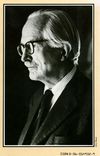The Curious Conspiracy: Difference between revisions
imported>Hayford Peirce (comma added) |
imported>Hayford Peirce (line space) |
||
| Line 4: | Line 4: | ||
'''The Curious Conspiracy''' is a collection of mystery stories by the British thriller writer [[Michael Gilbert]], first published in 2002 by the American company [[Crippen & Landru]] and unpublished in England. Published to recognize Gilbert's 90th birthday, it contains 20 previously uncollected stories, as well as a brief introduction by Gilbert himself and an appendix for Sources. Some of the stories feature one or another of Gilbert's many recurring characters that he created throughout his long career of writing both novels and short stories, including [[Inspector Hazlerigg|Chief Inspector Hazlerigg]] and [[Patrick Petrella|Inspector Petrella]]. Gilbert's introduction says that the topics covered by the stories are "catholic", in the sense of being "of universal human interest; touching the needs, interests of sympathies of all men."<ref>Introduction by Michael Gilbert to ''The Curious Conspiracy'', Crippen & Landru, Norfolk, Virginia, 2002, page 8</ref> The locales vary from London to a Red Sea shiekdom and the time frame from the present day to the [[Peninsular War]]; in one of them Sherlock Holmes makes an appearance. Some of them, such as "Judith", have an unexpected grimness about them. "Michael was an exceptionally fine storyteller, but he's hard to classify," said one of his British publishers after his death. "He's not a [[hard-boiled writer]] in the classic sense, but there is a hard edge to him, a feeling within his work that not all of society is rational, that virtue is not always rewarded.".<ref>Douglas Greene of Crippen & Landrau, quoted in ''The New York Times'', 15 February 2006</ref> | '''The Curious Conspiracy''' is a collection of mystery stories by the British thriller writer [[Michael Gilbert]], first published in 2002 by the American company [[Crippen & Landru]] and unpublished in England. Published to recognize Gilbert's 90th birthday, it contains 20 previously uncollected stories, as well as a brief introduction by Gilbert himself and an appendix for Sources. Some of the stories feature one or another of Gilbert's many recurring characters that he created throughout his long career of writing both novels and short stories, including [[Inspector Hazlerigg|Chief Inspector Hazlerigg]] and [[Patrick Petrella|Inspector Petrella]]. Gilbert's introduction says that the topics covered by the stories are "catholic", in the sense of being "of universal human interest; touching the needs, interests of sympathies of all men."<ref>Introduction by Michael Gilbert to ''The Curious Conspiracy'', Crippen & Landru, Norfolk, Virginia, 2002, page 8</ref> The locales vary from London to a Red Sea shiekdom and the time frame from the present day to the [[Peninsular War]]; in one of them Sherlock Holmes makes an appearance. Some of them, such as "Judith", have an unexpected grimness about them. "Michael was an exceptionally fine storyteller, but he's hard to classify," said one of his British publishers after his death. "He's not a [[hard-boiled writer]] in the classic sense, but there is a hard edge to him, a feeling within his work that not all of society is rational, that virtue is not always rewarded.".<ref>Douglas Greene of Crippen & Landrau, quoted in ''The New York Times'', 15 February 2006</ref> | ||
==Stories in order== | ==Stories in order== | ||
Revision as of 21:08, 3 November 2016
The Curious Conspiracy is a collection of mystery stories by the British thriller writer Michael Gilbert, first published in 2002 by the American company Crippen & Landru and unpublished in England. Published to recognize Gilbert's 90th birthday, it contains 20 previously uncollected stories, as well as a brief introduction by Gilbert himself and an appendix for Sources. Some of the stories feature one or another of Gilbert's many recurring characters that he created throughout his long career of writing both novels and short stories, including Chief Inspector Hazlerigg and Inspector Petrella. Gilbert's introduction says that the topics covered by the stories are "catholic", in the sense of being "of universal human interest; touching the needs, interests of sympathies of all men."[1] The locales vary from London to a Red Sea shiekdom and the time frame from the present day to the Peninsular War; in one of them Sherlock Holmes makes an appearance. Some of them, such as "Judith", have an unexpected grimness about them. "Michael was an exceptionally fine storyteller, but he's hard to classify," said one of his British publishers after his death. "He's not a hard-boiled writer in the classic sense, but there is a hard edge to him, a feeling within his work that not all of society is rational, that virtue is not always rewarded.".[2]
Stories in order
- Introduction, page 7, by Michael Gilbert
- Audited and Found Correct, page 9
- Friends of the Groom, page 21, Chief Inspector Hazlerigg
- The Blackmailer, page 27
- Squeeze Play, page 35
- Under the Last Scuttleful, page 40
- Scream in A Soundproofed Room, page 45
- The Sheik Goes Shopping, page 52
- Clos Carmine, page 63
- The Curious Conspiracy, page 69
- Blood Match, page 81
- The Seventh Musket, page 90 — set during the Peninsular War
- The Inside Pocket, page 106
- Freedom of the Press, page 122, Detective Sergeant Petrella
- Miss Bell's Stocking, page 133, Detective Sergeant Petrella
- Five on the Gun, page 144
- The Jackal and the Tiger, page 149
- Judith, page 172
- Verdict of Three, page 185
- Decoy, page 198
- Dead Reckoning, page 224
- Sources, page 234
